Although the prospect of death makes us miserable, it forces us to confront our mortality and search for a remedy, if we do not immediately numb ourselves with the drug of distraction.
“Soles occidere et redire possunt [Suns are able to die and rise again]” —Gaius Valerius Catullus, Carmen 5.[1]
 One morning, as I walked out the back door to head toward my car, a cat with dirty fur wobbled on awkward, unsteady legs against the white wall of my garage. We have had many stray cats in our neighborhood in the past so it wasn’t a strange occurrence to see an unfamiliar mammal in the backyard. But what struck me was its pitifulness: the way it hopped forward in a jerky manner, unable to trot normally, and fell over twice. It glanced back at me before disappearing around the corner.
One morning, as I walked out the back door to head toward my car, a cat with dirty fur wobbled on awkward, unsteady legs against the white wall of my garage. We have had many stray cats in our neighborhood in the past so it wasn’t a strange occurrence to see an unfamiliar mammal in the backyard. But what struck me was its pitifulness: the way it hopped forward in a jerky manner, unable to trot normally, and fell over twice. It glanced back at me before disappearing around the corner.
The cat was searching for a place to die.
I can’t say what kind of disease it had, but I knew there would soon be a flock of buzzards surrounding a fuzzy corpse. I am no cat-lover, but this sight did overshadow my morning with a noticeable twinge of sadness, and for two primary reasons, I think: First, it reminded me of death and the nature of sickness; second, it made me consider what other creatures—I mean, humans—are crawling on their way to die, literally, figuratively, and spiritually. Isn’t it a haunting thought to imagine how many people are dying violent deaths, just out of our sight, by suicide, starvation, disease, and war? And not just in the physical realm: casualties of spiritual warfare, depressed and violent souls, emotional anguish caused by disjointed families and verbal abuse, cultural confusion sparked by a suppression of truth and religion, all these present in their own guises in our culture and globally.
And it has always been this way. Only now our culture doesn’t know it’s dying, or we’re too afraid to truly acknowledge it. In America today, it is commonplace for people die in hospitals, the place of medicine and healing, rather than in their own homes—much more so than in the past. Our movies and novels portray murder, homicide, suicide, and all sorts of gore, yet we pretty up our deceased, often less out of courtesy and more for the purpose that we might pretend decay only exists in the imagination and the cinema;. It is because we are afraid of the real deal, and our materialism can’t save us. There is something horrifying and ugly about death and decay; we might ignore it but we can’t deny it.
A noteworthy Roman lyric poet, Catullus, cleverly reveals this human fault of self-inflicted apathy or forgetfulness. In a brief moment addressing his lover, he recognizes the finality of death: “Nobis cum semel occidit brevis lux, / nox est perpetua una dormienda [For us, once the brief light dies, / one perpetual night must be slept through].”[2] He slips this verse into a poem about his relationship with his lover and, as though catching himself, suddenly switches to begging for kisses: The haunt of death peeps to the surface for a moment before he squelches it by distracting himself with sexuality. That line is the only time he seems truly honest and transparent, and in so doing, he uncovers the distracted mentality of his time that we would rather have our fill of transient candies that make us “forget” for a while, rather than acknowledge the looming reality of death and the frailty of the material world and our own existence.
Blaise Pascal, a French philosopher and Christian apologist, adds to this observation and refers to it as “diversion,” surmising that “being unable to cure death, wretchedness and ignorance, men have decided, in order to be happy, not to think about such things” because these things remind them of their feeble, mortal, unhappy condition.[3] Each man and woman has his or her own way of diversion, be it by boisterous social life, gambling, drinking, war, excellent cuisine, travel, romance, financial security and gain, technology, even philosophy if it is the kind that has a perspective as wide as the point of a pin and that endlessly toils for no real purpose—none of these are “true bliss.”[4] Instead, these activities and addictions serve only to drown out the piercing and alarming voice of reality and death. Engaging in such activities diverts our attention to pleasures and excitement and inhibits keen introspective thought, the sort that would make us painfully aware of our wretchedness and mortality.
Although the prospect of death makes us miserable, it forces us to confront our mortality and search for a remedy, if we do not immediately numb ourselves with the drug of distraction. The problem of a mortal is that he is mortal. The remedy is to become immortal. But, of course, that remedy is beyond mortal capability, by definition. Likewise, the problem of man is that he is wretched and sinful. The remedy is to become truly happy and good. But again, that lies beyond his capacity. One might argue, as Rousseau did, that man is naturally good but is corrupted by society, or by whatever other cause someone may conjure, but can anyone argue that man, at some point, sooner or later, will most certainly die? There is no remedy, then, it seems.
Unless, that is, he turns, to a higher being who is immortal, perfect, and good, and has the ability, and the benevolence, to cure us of our condition. Religion in general aims to answer man’s challenging questions and to point to a solution that remedies his insuperable problem—namely that of his inevitable fate. The stare of death goads religion for a satisfactory reply, and subsequently, a response is given, but, as Pascal affirms, it ought be one that leads to the acquisition of happiness: true happiness, not a numbing counterfeit. So, in order to accomplish this, religion must be true and give true answers and solutions:
To make man happy [true religion] must show him that a God exists whom we are bound to love; that our true bliss is to be in him, and our sole ill to be cut off from him. It must acknowledge that we are full of darkness which prevents us from knowing and loving him, and so, with our duty obliging us to love God and our concupiscence leading us astray, we are full of unrighteousness. It must account to us for the way in which we thus go against God and our own good. It must teach us the cure for our helplessness and the means of obtaining this cure.[5]
After a string of arguments, Pascal, in confidence, concludes that the only religious practice that unfalteringly, effectively upholds the standards of true religion is Christianity. Christianity shows us an immortal God who, by submitting himself to death, defeated death once and for all in the Harrowing of Hell, and who offers the gift of grace and reconciliation—to become a new creature by dying to the old self, and to have the hope of a blissful afterlife, by faith in him through his Son, Jesus Christ. The mortal does not become an immortal and does not avoid death, per se, but does attain everlasting life, the happiest and fullest of ends, as well as the restoration of his relationship with God, fulfilling the human duty to worship and serve him.
The removal of distraction is the first step towards eternal life. We by ourselves cannot solve the problem of death, literally, figuratively, or spiritually, and destruction and evil still reign on the earth despite our objections and attempts. One can only ignore it for only so long, and perhaps after it is too late. Joseph Pearce wrote an excellent essay in these very pages, “Distracting Ourselves to Death,” outlining the pride and narcissism of addiction, particularly electronic, and its remedy, humility and truth and wonder. We may not have the power to subdue death and destruction, but we know who does have it and who lends us this power. Because of Christ’s sacrifice, we may look upon the misery of our world with great sorrow, yet without fear or despair. Let us, then, follow the example of a humble, contrite spirit, aware of his own frailty and destiny, and embrace the Way, the Truth, and the Life. Find the proper place to die, so that you may live, reborn and renewed.
The Imaginative Conservative applies the principle of appreciation to the discussion of culture and politics—we approach dialogue with magnanimity rather than with mere civility. Will you help us remain a refreshing oasis in the increasingly contentious arena of modern discourse? Please consider donating now.
Notes:
[1] Conveniently, in English, a Christian pun on “sons.” [Translation mine]
[2] Catullus, Carmen 5 “One Thousand Kisses.” [Translation mine]
[3] Blaise Pascal, Pensées (Penguin Classics, 1995), p. 37.
[4] Pascal, p. 38.
[5] Pascal, p. 46.
The featured image is “The Angel of Death” (1851) by Émile Jean-Horace Vernet, and is in the public domain, courtesy of Wikimedia Commons.


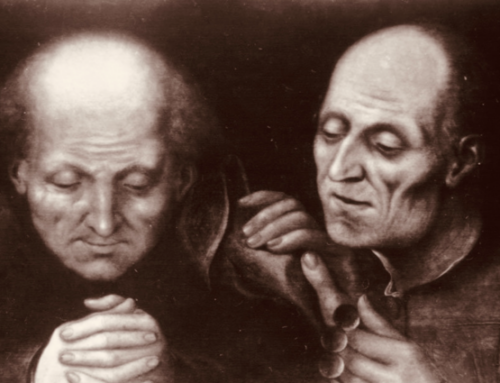
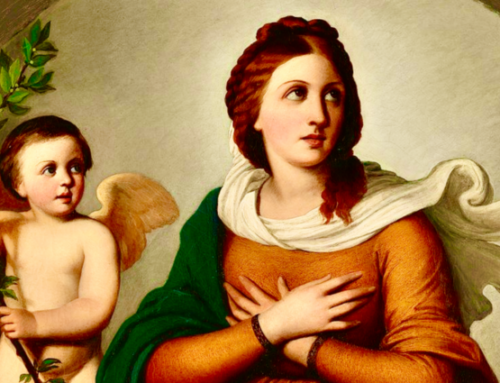
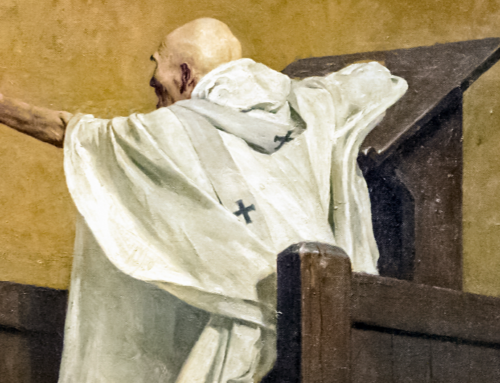
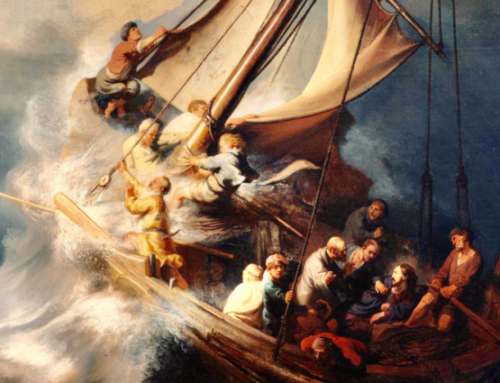
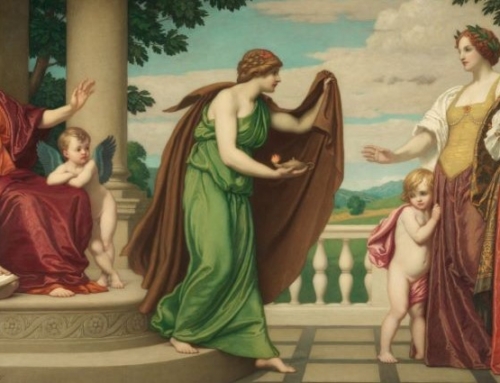
Leave A Comment